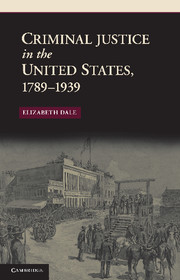Book contents
- Frontmatter
- Contents
- Introduction
- 1 criminal justice and the nation, 1789–1860
- 2 crime and justice in the states, 1789–1839
- 3 law versus justice in the states, 1840–1865
- 4 states and nation, 1860–1900
- 5 criminal justice, 1900–1936
- 6 rights and the turn to law, 1937–1939
- Conclusion
- Bibliographic Essay
- Index
- References
5 - criminal justice, 1900–1936
Published online by Cambridge University Press: 05 June 2012
- Frontmatter
- Contents
- Introduction
- 1 criminal justice and the nation, 1789–1860
- 2 crime and justice in the states, 1789–1839
- 3 law versus justice in the states, 1840–1865
- 4 states and nation, 1860–1900
- 5 criminal justice, 1900–1936
- 6 rights and the turn to law, 1937–1939
- Conclusion
- Bibliographic Essay
- Index
- References
Summary
The Supreme Court had largely ignored the problem of mob violence and popular justice through the end of the nineteenth century, but in the first decades of the twentieth century that became harder and harder to do. Still, the Court resisted; not until 1923 did it finally agree that federal courts could intervene to protect the due process rights of defendants tried in state courts amid threats of lynching. That shift was part of a significant, but somewhat haphazard change in direction on the part of the Court as it began to place greater emphasis on the need to protect due process in criminal cases in the years before 1936. The Court was not alone in its increasing concern with popular justice; state governments and Congress also focused more attention on that problem in the first decades of the twentieth century. Yet a variety of factors undermined many of those efforts.
the Supreme Court and due process
The Supreme Court’s gradual shift in attitude began at the start of the new century. In 1906 a black man named Ed Johnson was arrested and tried in Tennessee on the charge that he had raped a white woman. After his conviction, his lawyers went to federal court with a petition for a writ of habeas corpus, raising two Fourteenth Amendment claims: that blacks had been excluded from the jury pool in his case in violation of the equal protection clause and that the threat of mob violence had intimidated his attorney, preventing Johnson from receiving the sort of legal assistance that due process required.
- Type
- Chapter
- Information
- Criminal Justice in the United States, 1789–1939 , pp. 97 - 121Publisher: Cambridge University PressPrint publication year: 2011

